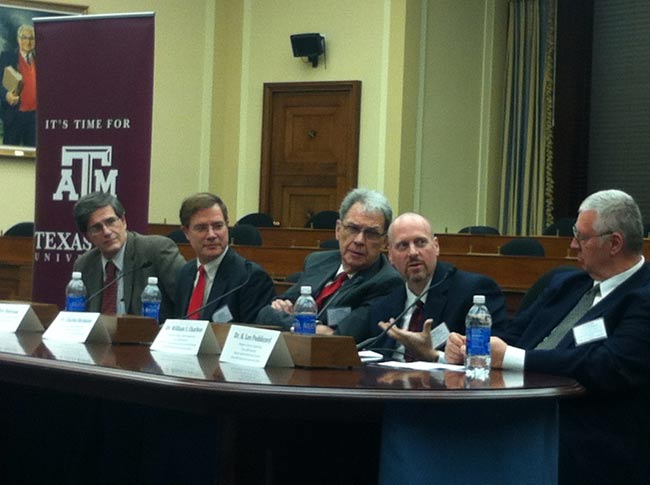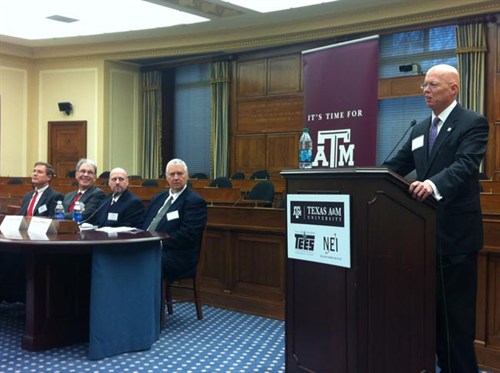
WASHINGTON, DC – The role of research universities in nuclear science, energy and policy was the topic of a Texas A&M-sponsored panel and reception last week in Washington, D.C., where panelists and speakers recognized the importance of higher education to ensuring the U.S. remains a global leader in nuclear research and development (R&D). The event was co-sponsored by Texas A&M University, the Texas A&M Engineering Experiment Station (TEES), and the Nuclear Energy Institute, a Washington, D.C.-based policy organization for the nuclear technologies industry.
Panelists included researchers from Texas A&M, University of California, Berkeley and University of Wisconsin-Madison. U.S. Representative William H. “Bill” Flores (R-Texas) and U.S. Deputy Secretary of Energy Daniel Poneman delivered remarks at the post-panel reception.
Mr. Poneman hailed Texas A&M as helping fill the nation’s “need for the next generation of researchers and PhDs.” Rep. Flores also recognized the University’s vast capabilities in nuclear engineering, while celebrating the role of federal funding for basic research as the “seed corn” for helping grow new technological innovation at research universities. Both speakers acknowledged nuclear energy, research and workforce development as critical to U.S. competitiveness and praised Texas A&M leadership in these areas.
Echoing these sentiments on the panel, Dr. K. Lee Peddicord, nuclear engineering professor and director of the TEES Nuclear Power Institute (NPI), discussed the adaptation of several NPI workforce-development programs as international models. Peddicord stated that the workforce-focus of these programs represents a new frontier for U.S. leadership.

“The United States has led the way in conveying best standards and practices, and in emphasizing the critical importance of safety, security and safeguards in the use of nuclear power,” said Peddicord. “But now international engagement for human resource development is taking on even broader dimensions beyond education and research.”
NPI workforce-development programs have been launched in junior colleges and high schools across Texas. Students, teachers and faculty from these programs presented posters at the reception and have traveled overseas with Dr. Peddicord as part of NPI’s international engagement initiative.
Texas A&M also has played a critical role in reshaping the landscape of nuclear engineering education in the U.S., said Dr. William S. Charlton, associate professor of nuclear engineering and director of the TEES Nuclear Security Science and Policy Institute. Charlton explained that, post-9/11, a select number of academicians recognized the need to “bring to bear the full capabilities of the U.S. nuclear community” to properly address potential threats of nuclear terrorism and nonproliferation.
“I and a very small number of other academics were heavily in favor of nuclear security and nonproliferation being added as a fundamental pillar of nuclear engineering education, stated Charlton. “Today, every major nuclear science and engineering program within the U.S. has some level of nuclear nonproliferation or nuclear security educational and research activities.”
“The inclusion of academics allowed for the formation of new knowledge in this area and the development of critical human capital educated specifically for this mission,” concluded Charlton.
Dr. Charles Hermann, professor and Brent Scowcroft Chair in International Policy Studies at Texas A&M’s Bush School of Government and Public Service, served as the only non-engineer on the panel. He too recognized the critical relation between science and policy.
“Attention to one without consideration of the other invites trouble,” stated Hermann. “In the 21st century the well-being of our country and planet will be enhanced if we can produce more renaissance experts who bridge the policy communities and in our finest science and engineering laboratories.”
Each panelist recognized the important role of federal funding agencies and policymakers to maintaining U.S. leadership in nuclear-related issues, through the funding of university-based research and the passage of policies not restrictive to new innovation.
The panel and reception took place in the Rayburn House Office Building on Capitol Hill.
Reprinted from the original Press Release by the Texas A&M Division of Research featured on TAMU Times.
Media Contact: Tom Hargis, [email protected], 979-458-1475